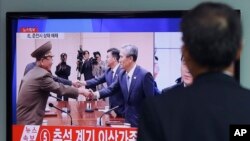The recent inter-Korean agreement that has ended a military standoff over a land mine attack that maimed two South Korean soldiers is causing controversy in South Korea.
In the South, which is still technically at war with its communist neighbor, an inter-Korean deal has traditionally been a point of contention, with two opposing camps engaged in heated, often emotional debate. South Korea’s “sunshine policy,” a policy of engagement and cooperation with North Korea, advocated by the late South Korean President Kim Dae-jung, has sparked a vigorous debate for many years, winning both praise and criticism.
The latest deal is not an exception.
Controversy over ‘apology’
The question at the heart of the controversy is whether South Korea won an appropriate apology from North Korea for the attack. Seoul has been calling on Pyongyang to apologize for the incident since August 10, when Seoul publicly accused Pyongyang of crossing the military demarcation line and planting land mines on the southern side of the demilitarized zone (DMZ).
In the deal, North Korea expressed “regret” over the incident, but did not offer an explicit apology. South Korea took the expression as an apology and stopped loudspeaker broadcasts across the DMZ as part of the agreement.
“The government stresses that it is extremely rare for the North to express ‘regret’ for any provocation, but critics say regret is nowhere near adequate for the severe maiming of two soldiers by North Korean box mines in the demilitarized zone,” said the Chosun Ilbo, South Korea’s conservative newspaper, in an editorial.
Different interpretation
North Korea fueled the controversy by spinning the deal in its favor. Hwang Pyong So, one of the two North Korean representatives at the talks, appeared on local television shortly after the agreement was announced.
“The South must have learned a serious lesson that it will bring an armed clash if it creates a groundless case and provokes the other side,” said Hwang, who is the North Korean military’s top political officer.
South Korean officials dismissed Hwang’s comments, saying what North Korea agreed to is important.
The United States is distancing itself from the controversy.
“I don’t think it would be appropriate for me here at the U.S. State Department to weigh and try to characterize the difference between the word ‘regret’ and ‘apology,’ ” spokesman John Kirby said at a news briefing this week. "The important thing is that they came to an agreement, and that we now have an opportunity for the tensions to be decreased.”
Only an acknowledgment
Bruce Klingner, a senior research fellow at the Heritage Foundation, a Washington-based think tank, said Pyongyang acknowledged the incident without taking responsibility for it.
“South Korean President Park Geun-hye can claim victory in forcing North Korea to acknowledge the land mine incident, though not its responsibility,” said Klingner.
Frank Jannuzi, president of the Mansfield Foundation, said the wording is not “a full-blown apology” for the incident, but it is a “concession” by North Korea. Jannuzi added the wording merits South Korea’s reciprocal step of stopping the propaganda broadcasts.
Park Hyeong-jung, a senior research fellow at the Korea Institute for National Unification, South Korea’s state-run think tank, said it would have been difficult for Pyongyang to admit the attack.
“If North Korea admits the attack, it would create a huge problem in and out of the country. Since Pyongyang had denied its involvement initially, it had to stick to the position,” said Park.
Kim Yong-hyun, a North Korean studies professor at South Korea’s Dongguk University, said Pyongyang would not have agreed to the deal if Seoul insisted on a full apology.
Past aggressions
Klingner said Pyongyang has never offered an explicit apology for its aggressions against Seoul.
One of the major incidents still being disputed between the two sides is the fatal sinking of a South Korean navy ship in March 2010, which claimed the lives of 46 South Korean sailors. A South Korea-led international investigation team concluded that North Korea’s torpedo attack was responsible for the sinking, but North Korea has denied involvement in the incident.
Experts say the implementation of the agreement would be key to the progress of inter-Korean ties.
“We’ve had promises from the North over and over again, and too often these promises go unfulfilled. The agreement is a nice start. But we have to wait and see whether or not the two sides will be able to build on it,” said Jannuzi.
Sungwon Baik and Hwan Yong Kim contributed to this report.





